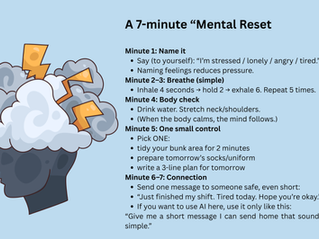Psychological First Aid Manual for Seafarers: A Crucial Tool to Identify and Assist others onboard
- Oct 18, 2023
- 2 min read

The Significance of Psychological First Aid (PFA) for Seafarers
Seafarers face a unique set of psychological challenges:
Isolation: The nature of maritime work often leads to extended periods away from loved ones. This isolation can intensify feelings of loneliness.
Repetitive Environment: The limited environment of a ship can sometimes feel monotonous and stifling, adding to mental strain.
Cultural Differences: Ships often have multi-national crews. While this diversity can be enriching, it can also lead to misunderstandings or feelings of exclusion.
These challenges underscore the importance of PFA as a critical tool in a ship's mental health toolkit.
Delving into Core Principles of PFA for Seafarers
Promote Safety: The physical environment can mirror one's psychological state. Ensuring a safe environment is the first step in managing psychological crises.
Listen Actively: Active listening involves fully concentrating, understanding, and responding to what the other person is saying. For seafarers in distress, feeling heard can be the first step towards healing.
Stay Calm and Composed: A calm demeanor is contagious. In psychological emergencies, presenting a composed front can reassure the distressed individual and pave the way for effective intervention.
Offer Practical Assistance: Sometimes, immediate needs might overshadow emotional distress. Identifying and addressing these needs can be therapeutic in itself.
Encourage Professional Help: PFA is a primary intervention. However, professional mental health support might be necessary for long-term well-being, especially in severe cases.
Identification – Digging Deeper
Being vigilant about mental well-being is crucial on ships. Apart from the signs mentioned:
Physical Symptoms: Unexplained aches, frequent fatigue, or drastic changes in sleep patterns can be indicators of underlying psychological distress.
Cognitive Indicators: Difficulty in concentrating, making decisions, or increased forgetfulness might signal mental strain.

Comprehensive Assistance Strategies
Peer Support Programs: These are training programs where crew members are trained to recognize signs of distress in their peers and provide immediate support.
Onboard Resources: Books, videos, or workshops about mental health can be valuable. An onboard 'mental well-being corner' can offer a retreat for crew members seeking solace.
Regular Check-ins: Captains or senior crew members can hold monthly meetings focusing on mental well-being. Such forums can offer crew members an opportunity to voice their concerns.
External Support: Having a dedicated helpline, which crew members can call when in distress, can bridge the gap between the ship and shore-based psychological services.
In Conclusion

A PFA manual for seafarers is more than just a document—it's a testament to the maritime industry's commitment to its workforce's mental well-being. By understanding, identifying, and assisting, we ensure that our seafarers, the backbone of global trade, receive the care and support they deserve.
Contact hr@imeq-center.com for IMEQ's Psychological First Aid Manual
























